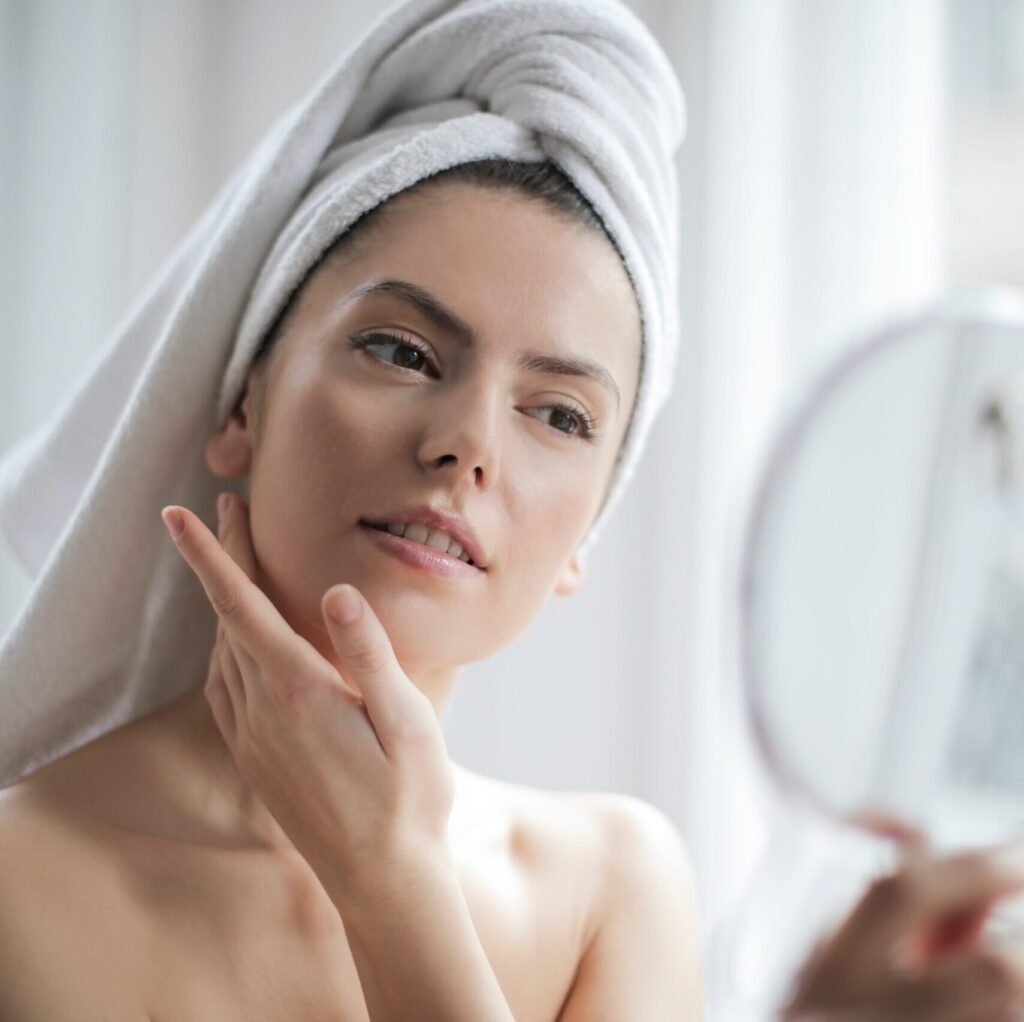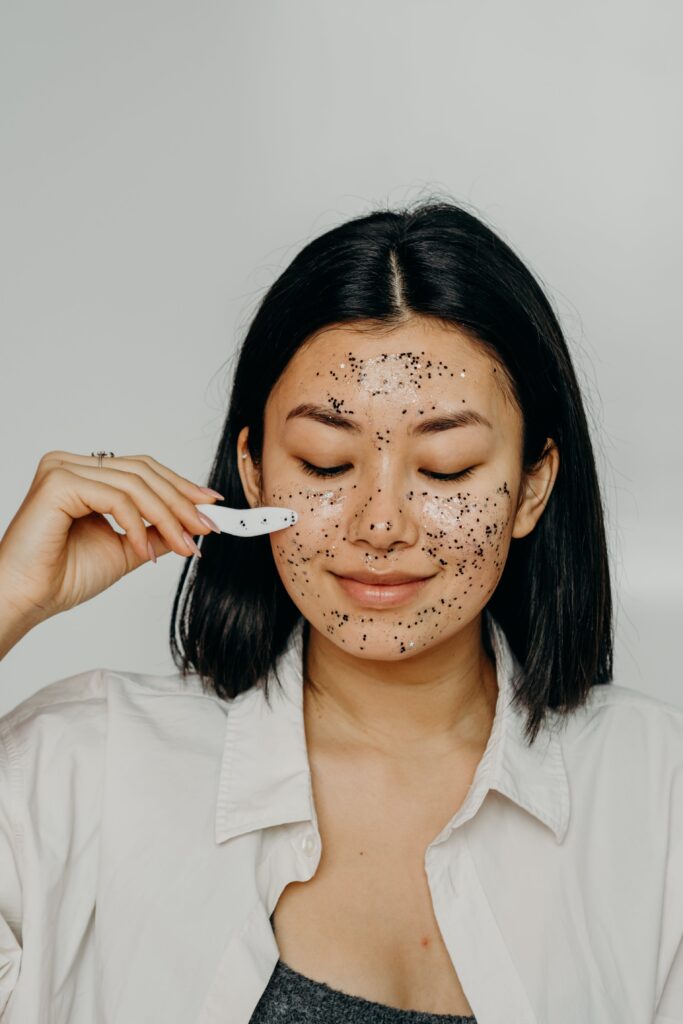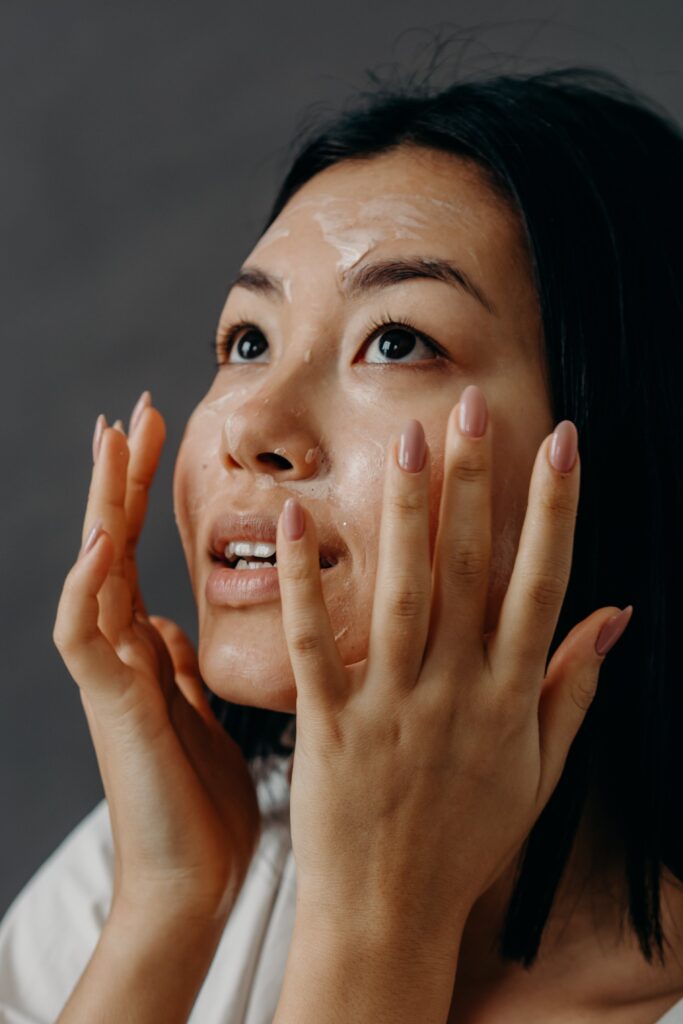Table of Contents
Ideal Skincare Routine
Let’s start with the basics: Skincare encompasses the practices, routines, and products utilized to uphold and enhance the health, appearance, and texture of the skin. This involves a broad spectrum of activities and products crafted to address diverse skin concerns and promote overall skin well-being. Typical skincare routines involve the fundamental steps of cleansing, moisturizing, and safeguarding the skin against environmental factors such as sunlight.
Key components of an effective skincare routine include:
1- Start skincare routine with cleansing:

Cleansing Eliminates dirt, oil, makeup, and other impurities from the skin’s surface. It is a crucial step in any skincare routine, and its importance lies in several key benefits for the health and appearance of the skin:
Removal of Impurities: Throughout the day, the skin accumulates dirt, oil, sweat, pollutants, and other environmental impurities. Cleansing helps to eliminate these substances, preventing them from clogging pores and causing various skin issues such as acne, blackheads, and breakouts.
Prevention of Breakouts: Regular cleansing helps to control excess oil production, reducing the likelihood of clogged pores and acne breakouts. It is particularly important for individuals with oily or acne-prone skin.
Cell Turnover and Renewal: Cleansing promotes the removal of dead skin cells, encouraging the natural process of cell turnover. This helps to reveal fresher, younger skin cells and contributes to a smoother complexion.
Enhanced Absorption of Skincare Products: A clean canvas allows skincare products, such as serums and moisturizers, to be more effectively absorbed into the skin. Unclogged pores and a clear surface enable these products to penetrate the skin and deliver their active ingredients more efficiently.
Support for Skin Barrier Function: The skin’s natural barrier, composed of lipids and proteins, helps protect against external irritants and maintains optimal hydration levels. Gentle cleansing helps preserve this barrier, preventing excessive dryness or sensitivity.
Prevention of Skin Conditions: Regular cleansing is essential for preventing and managing various skin conditions, including dermatitis, infections, and other inflammatory issues. Keeping the skin clean reduces the risk of irritation and infections.
Promotion of Overall Skin Health: Maintaining a clean and healthy skin surface contributes to the overall well-being of the skin. It supports a radiant complexion, minimizes the appearance of pores, and can contribute to a more even skin tone.
While cleansing is crucial, it’s important to choose a gentle cleanser suitable for your skin type and to avoid over-cleansing, as excessive washing can strip the skin of its natural oils, leading to dryness and irritation. Establishing a consistent cleansing routine, tailored to your skin’s needs, is key to reaping the full benefits of this essential skincare step.
2- Remove dead skin cell from skin by exfoliating:

Exfoliating is an important step in skincare because it helps remove dead skin cells from the surface of the skin. This process offers several benefits that contribute to healthier, more radiant skin:
Promotes Cell Turnover: Exfoliation accelerates the natural process of cell turnover, wherein old, dead skin cells are replaced by newer ones. This helps reveal fresher, more youthful-looking skin.
Improves Skin Texture: By sloughing off dead skin cells, exfoliation helps to smooth the skin’s surface, reducing roughness and creating a more even texture. This can be particularly beneficial for individuals with rough or uneven skin.
Unclogs Pores: Exfoliation helps prevent the buildup of dead skin cells, oil, and debris within pores. This can reduce the likelihood of clogged pores, blackheads, and acne breakouts.
Enhances Product Absorption: With a clearer surface, skincare products such as serums, moisturizers, and treatments can penetrate the skin more effectively. This ensures that active ingredients reach deeper layers, maximizing their effectiveness.
Brightens Complexion: Regular exfoliation can contribute to a brighter complexion by removing dull, dead skin cells and promoting the emergence of newer, healthier skin. This is particularly beneficial for addressing issues like uneven skin tone and pigmentation.
Reduces the Appearance of Fine Lines and Wrinkles: Exfoliating can help diminish the appearance of fine lines and wrinkles by encouraging the production of new, plump skin cells. It also enhances the effectiveness of anti-aging products.
Addresses Hyperpigmentation: Exfoliation can be helpful in reducing the appearance of dark spots and hyperpigmentation by encouraging the turnover of skin cells and promoting a more even skin tone.
It’s important to note that there are two main types of exfoliation: physical (using scrubs or brushes) and chemical (using acids or enzymes). The choice between these methods depends on individual skin type and sensitivity. Over-exfoliation should be avoided, as it can lead to irritation and compromise the skin’s barrier. Incorporating exfoliation into your skincare routine, typically 1-3 times per week, can help maintain a healthy and vibrant complexion.
3- Moisturize your skin:

Moisturizing is a crucial step in skincare, and it offers numerous benefits that contribute to the health and appearance of the skin. Here are some key reasons why moisturizing is helpful:
Hydration: Moisturizers provide essential hydration to the skin, helping to maintain its moisture balance. Well-hydrated skin appears plump, healthy, and feels more comfortable.
Prevents Dryness: Dry skin can lead to discomfort, flakiness, and irritation. Moisturizers create a protective barrier on the skin’s surface, preventing water loss and maintaining optimal hydration levels.
Supports Skin Barrier Function: The skin’s natural barrier, composed of lipids and proteins, helps protect against external irritants. Moisturizers reinforce this barrier, promoting resilience and minimizing the risk of sensitivity.
Soothes Irritated Skin: Moisturizers with calming ingredients can soothe and alleviate irritated or inflamed skin. This is especially beneficial for individuals with conditions like eczema or sensitive skin.
Reduces Signs of Aging: Proper hydration can minimize the appearance of fine lines and wrinkles. Well-moisturized skin appears more youthful and supple.
Creates a Smooth Canvas: Moisturizers contribute to smoother skin texture by filling in fine lines and providing a base for makeup application. This can result in a more even and polished complexion.
Improves Skin Tone: Some moisturizers contain ingredients that help even out skin tone, reduce dark spots, and promote a more radiant complexion.
Enhances Product Absorption: Moisturized skin allows other skincare products, such as serums and treatments, to be absorbed more effectively. This ensures that active ingredients penetrate the skin and deliver their intended benefits.
Adaptable to Different Skin Types: There are various moisturizers tailored to different skin types, including those for oily, dry, combination, or sensitive skin. Finding the right moisturizer for your specific needs can address your skin’s unique requirements.
Comfort and Wellness: Regular moisturizing contributes to the overall comfort and wellness of the skin. It can alleviate tightness, itching, and discomfort associated with dry or dehydrated skin.
Choosing a moisturizer that suits your skin type and concerns is essential for reaping these benefits. Whether you have oily, dry, or combination skin, incorporating a moisturizer into your daily skincare routine helps maintain a healthy and balanced complexion.
4- Protect skin by using sun protection:

Sun protection is crucial for the face and neck for several reasons, as these areas are particularly vulnerable to the harmful effects of ultraviolet (UV) radiation. Here’s why sun protection is important:
- Prevents Sunburn: The face and neck are often exposed to sunlight, making them susceptible to sunburn. Sunscreen helps prevent the skin from burning, reducing redness, pain, and discomfort.
- Reduces the Risk of Skin Cancer: Prolonged exposure to UV radiation is a leading cause of skin cancer. Regular use of sunscreen on the face and neck helps minimize the risk of developing skin cancers, including melanoma, squamous cell carcinoma, and basal cell carcinoma.
- Prevents Premature Aging: UV rays accelerate the aging process of the skin by breaking down collagen and elastin fibers. Sunscreen protects against photoaging, helping to minimize the appearance of wrinkles, fine lines, and sagging skin on the face and neck.
- Minimizes Hyperpigmentation: Sun exposure can lead to the development of dark spots, freckles, and uneven skin tone. Sunscreen helps prevent hyperpigmentation, promoting a more even complexion.
- Preserves Skin Elasticity: UV rays can damage the skin’s elastin fibers, leading to loss of elasticity and firmness. Sun protection aids in preserving the skin’s natural elasticity, contributing to a more youthful appearance.
- Protects Against UV-Induced Skin Diseases: Besides cancer, prolonged sun exposure can contribute to various skin conditions, including sunburn, actinic keratosis, and photosensitivity disorders. Sunscreen provides a protective barrier against these harmful effects.
- Maintains Skin Health: UV rays can compromise the skin’s health by causing inflammation and oxidative stress. Sun protection helps maintain the overall health of the skin, reducing the risk of damage and irritation.
- Prevents Dilated Blood Vessels: Prolonged sun exposure can lead to the dilation of blood vessels, contributing to the development of conditions like rosacea. Sunscreen helps minimize the risk of vascular issues on the face and neck.
When selecting a sunscreen for the face and neck, it’s essential to choose a broad-spectrum formula with SPF (Sun Protection Factor) appropriate for your skin type. Regular application, even on cloudy days, is crucial for effective sun protection. Additionally, wearing hats, sunglasses, and seeking shade during peak sunlight hours further enhances overall sun safety.
5- Skin glow better by healthy lifestyle practices:

Adopting healthy lifestyle practices is instrumental in promoting the overall well-being of your skin. Here are some key practices that contribute to skin health:
- Balanced Diet:
- Antioxidant-Rich Foods: Include fruits and vegetables with antioxidants (e.g., berries, leafy greens, citrus fruits) to help combat free radicals that can damage skin cells.
- Omega-3 Fatty Acids: Incorporate sources like fatty fish, flaxseeds, and walnuts for their anti-inflammatory properties, promoting skin health.
- Hydration:
- Drink an adequate amount of water to maintain skin hydration and overall health. Dehydration can lead to dry and dull skin.
- Adequate Sleep:
- Ensure you get enough sleep each night (7-9 hours for adults) to allow the skin to repair and regenerate. Lack of sleep can contribute to the appearance of fine lines and dark circles.
- Sun Protection:
- Use sunscreen with at least SPF 30 daily, even on cloudy days, to protect the skin from harmful UV rays that can cause sunburn, premature aging, and increase the risk of skin cancer.
- Gentle Cleansing:
- Cleanse your skin regularly using a gentle cleanser suitable for your skin type to remove impurities without causing irritation.
- Moisturizing:
- Apply a moisturizer suitable for your skin type to keep the skin hydrated, prevent dryness, and maintain a healthy moisture balance.
- Regular Exercise:
- Engage in regular physical activity to promote circulation, which helps nourish skin cells and keep the skin looking vibrant. Remember to cleanse your face post-workout to remove sweat and prevent breakouts.
- Manage Stress:
- Practice stress-reducing techniques such as meditation, deep breathing, or yoga, as chronic stress can contribute to skin issues like acne and flare-ups of conditions like psoriasis and eczema.
- Avoid Smoking:
- Smoking accelerates the aging process and can lead to wrinkles and skin sagging. Quitting or avoiding smoking contributes to healthier-looking skin.
- Limit Alcohol Consumption:
- Excessive alcohol consumption can dehydrate the skin and contribute to inflammation. Moderation is key for overall skin health.
- Protect Against Environmental Factors:
- Wear protective clothing, such as hats and sunglasses, to shield the skin from environmental elements like wind and pollution.
- Regular Skincare Routine:
- Establish and maintain a consistent skincare routine tailored to your skin type and concerns. This may include cleansing, exfoliating, moisturizing, and using targeted treatments.
Remember that individual skin needs may vary, and it’s essential to pay attention to your skin’s specific requirements. Consulting with a dermatologist can provide personalized advice and guidance for addressing specific skin concerns and maintaining a healthy complexion.
It’s crucial to recognize that skincare is a personal and evolving process. Understanding your skin type, maintaining consistency in your routine, and adjusting to the changing needs of your skin are pivotal aspects of effective skincare. There are many celebrities who follows more or less same routine and it might be interesting for you to read clickhere. Consulting with a dermatologist can also offer personalized guidance for addressing specific skin concerns.


No Responses